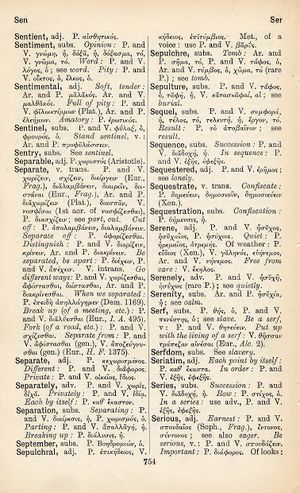separate: Difference between revisions
οὐ γὰρ ἀργίας ὤνιον ἡ ὑγίεια καὶ ἀπραξίας, ἅ γε δὴ μέγιστα κακῶν ταῖς νόσοις πρόσεστι, καὶ οὐδὲν διαφέρει τοῦ τὰ ὄμματα τῷ μὴ διαβλέπειν καὶ τὴν φωνὴν τῷ μὴ φθέγγεσθαι φυλάττοντος ὁ τὴν ὑγίειαν ἀχρηστίᾳ καὶ ἡσυχίᾳ σῴζειν οἰόμενος → for health is not to be purchased by idleness and inactivity, which are the greatest evils attendant on sickness, and the man who thinks to conserve his health by uselessness and ease does not differ from him who guards his eyes by not seeing, and his voice by not speaking
(3_12) |
m (Woodhouse1 replacement) |
||
| Line 1: | Line 1: | ||
{{Woodhouse1 | {{Woodhouse1 | ||
|Text=[[File:woodhouse_754.jpg|thumb|link={{filepath:woodhouse_754.jpg}}]] | |Text=[[File:woodhouse_754.jpg|thumb|link={{filepath:woodhouse_754.jpg}}]] | ||
===verb transitive=== | |||
P. and V. χωρίζειν, σχίζειν, διείργειν (Eur., '' | [[prose|P.]] and [[verse|V.]] [[χωρίζειν]], [[σχίζειν]], [[διείργειν]] ([[Euripides|Eur.]], ''Fragment''), [[διαλαμβάνειν]], [[διαιρεῖν]], [[δαστάναι]] ([[Euripides|Eur.]], ''Fragment''), [[Aristophanes|Ar.]] and [[prose|P.]] [[διαχωρίζειν]] ([[Plato]]), [[διασπᾶν]], [[verse|V.]] [[νοσφίσαι]] (1st aor. of [[νοσφίζεσθαι]]), [[prose|P.]] [[διασχίζειν]]; see [[part]], [[cut]]. | ||
[[cut off]]: [[prose|P.]] [[ἀπολαμβάνειν]],[[διαλαμβάνειν]]. | |||
[[separate off]]: [[prose|P.]] [[ἀφορίζεσθαι]]. | |||
[[distinguish]]: [[prose|P.]] and [[verse|V.]] [[διορίζειν]], [[κρίνειν]], [[Aristophanes|Ar.]] and [[prose|P.]] [[διακρίνειν]]. | |||
[[be separated]], [[be apart]]: [[prose|P.]] [[διέχειν]], [[prose|P.]] and [[verse|V.]] [[ἀπέχειν]]. | |||
===verb intransitive=== | |||
[[go different ways]]: [[prose|P.]] and [[verse|V.]] [[χωρίζεσθαι]], [[ἀφίστασθαι]], [[διίστασθαι]], [[Aristophanes|Ar.]] and [[prose|P.]] [[διακρίνεσθαι]]. | |||
[[when we separated]]: [[prose|P.]] [[ἐπειδὴ ἀπηλλάγημεν]] ([[Demosthenes|Dem.]] 1169). | |||
[[break up]] (of a [[meeting]], etc.): [[prose|P.]] and [[verse|V.]] [[διαλύεσθαι]] ([[Euripides|Eur.]], ''[[Iphigenia in Aulis]]'' 495). | |||
[[fork]] (of a [[road]], etc.): [[prose|P.]] and [[verse|V.]] [[σχίζεσθαι]]. | |||
''' | [[separate from]]: [[prose|P.]] and [[verse|V.]] [[ἀφίστασθαι]] (gen.), [[verse|V.]] [[ἀποζεύγνυσθαι]] (gen.) ([[Euripides|Eur.]], ''[[Hercules Furens]]'' 1375). | ||
===adjective=== | |||
[[prose|P.]] [[κεχωρισμένος]]. | |||
[[different]]: [[prose|P.]] and [[verse|V.]] [[διάφορος]]. | |||
[[private]]: [[prose|P.]] and [[verse|V.]] [[οἰκεῖος]], [[ἴδιος]]. | |||
}} | }} | ||
{{Lewis | {{Lewis | ||
Revision as of 08:50, 20 May 2020
English > Greek (Woodhouse)
verb transitive
P. and V. χωρίζειν, σχίζειν, διείργειν (Eur., Fragment), διαλαμβάνειν, διαιρεῖν, δαστάναι (Eur., Fragment), Ar. and P. διαχωρίζειν (Plato), διασπᾶν, V. νοσφίσαι (1st aor. of νοσφίζεσθαι), P. διασχίζειν; see part, cut.
cut off: P. ἀπολαμβάνειν,διαλαμβάνειν.
distinguish: P. and V. διορίζειν, κρίνειν, Ar. and P. διακρίνειν.
be separated, be apart: P. διέχειν, P. and V. ἀπέχειν.
verb intransitive
go different ways: P. and V. χωρίζεσθαι, ἀφίστασθαι, διίστασθαι, Ar. and P. διακρίνεσθαι.
when we separated: P. ἐπειδὴ ἀπηλλάγημεν (Dem. 1169).
break up (of a meeting, etc.): P. and V. διαλύεσθαι (Eur., Iphigenia in Aulis 495).
fork (of a road, etc.): P. and V. σχίζεσθαι.
separate from: P. and V. ἀφίστασθαι (gen.), V. ἀποζεύγνυσθαι (gen.) (Eur., Hercules Furens 1375).
adjective
different: P. and V. διάφορος.
private: P. and V. οἰκεῖος, ἴδιος.
Latin > English (Lewis & Short)
sēpărātē: adv., v. separo,
I P a. fin.
Latin > French (Gaffiot 2016)
sēpărātē, seult au comp. separatius : Cic. Inv. 2, 156, à part, plus spécialement.
Latin > German (Georges)
sēparātē, Adv. (separatus), doch nur im Compar., besonders, quaedam argumentationes communiter et similiter tractabuntur, quaedam separatius ad finem adiungentur, Cic. de inv. 2, 156.

